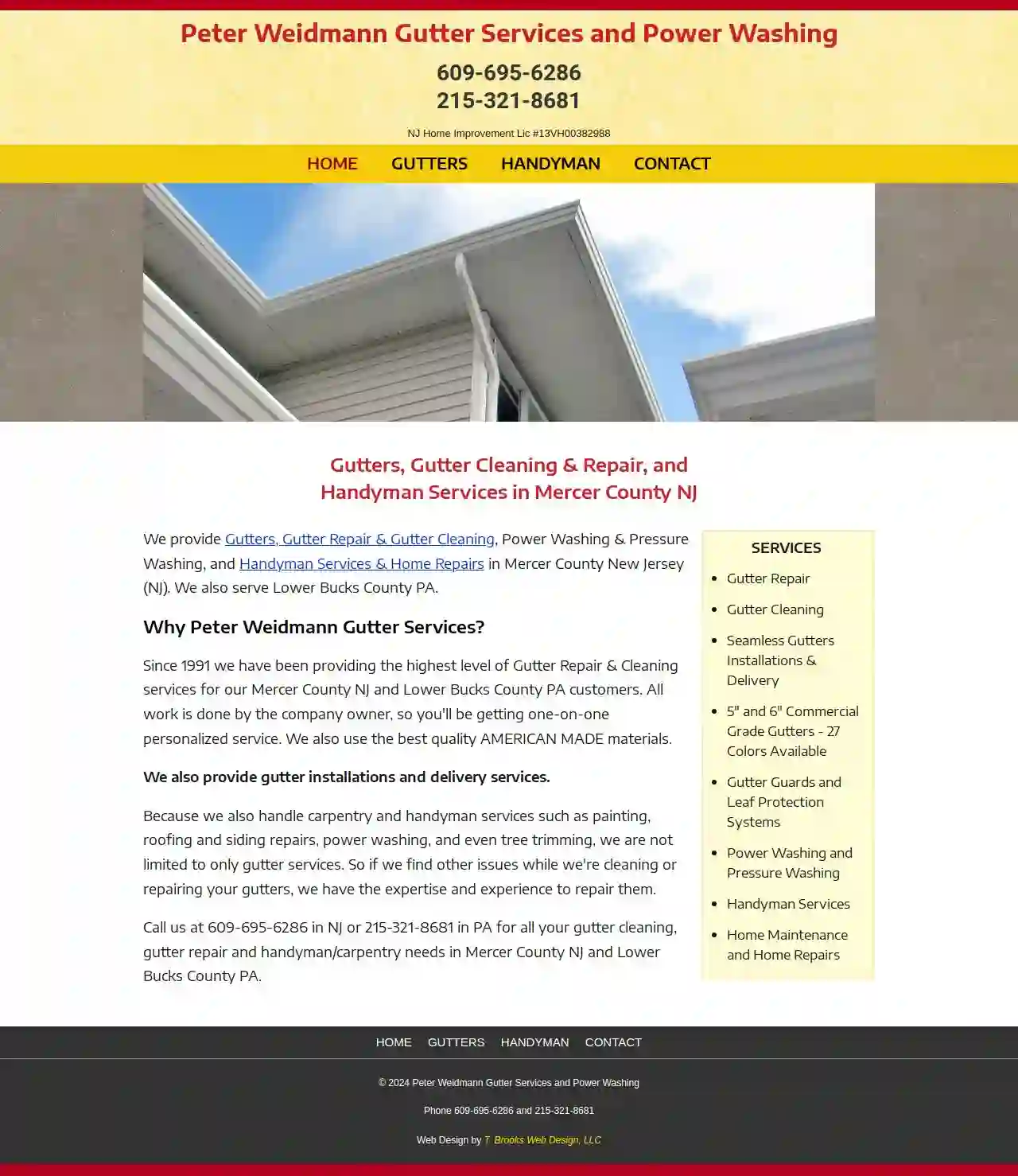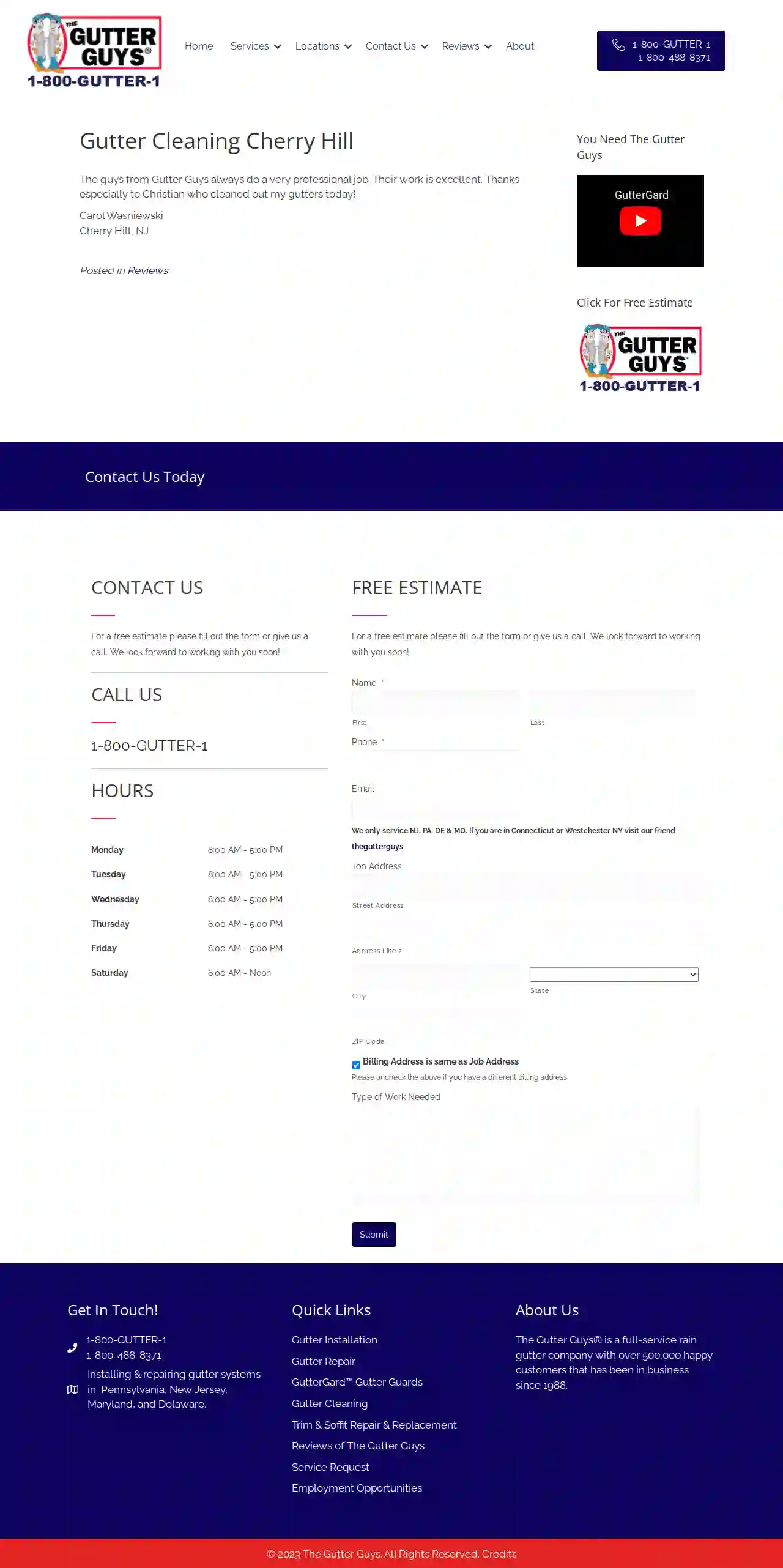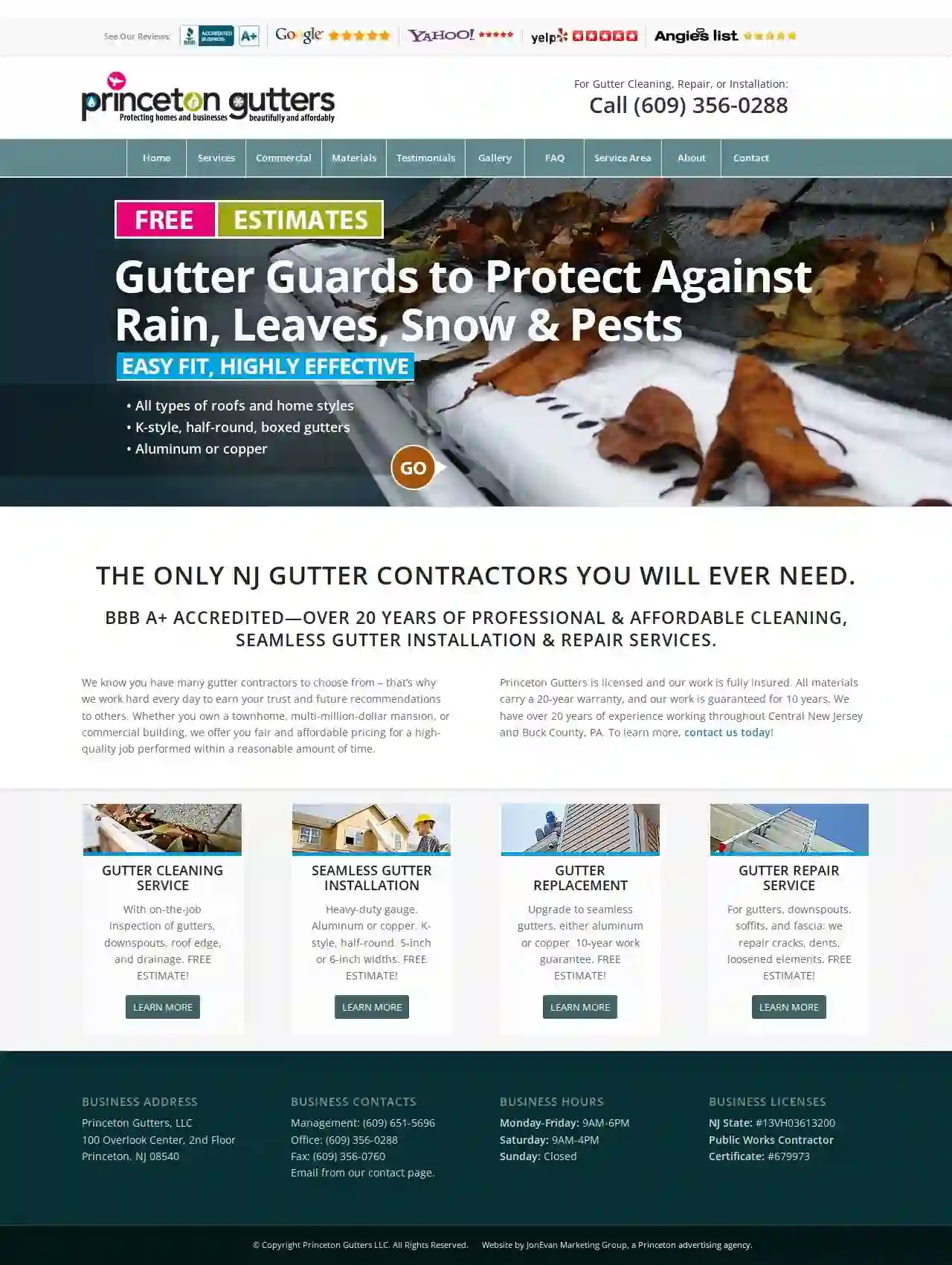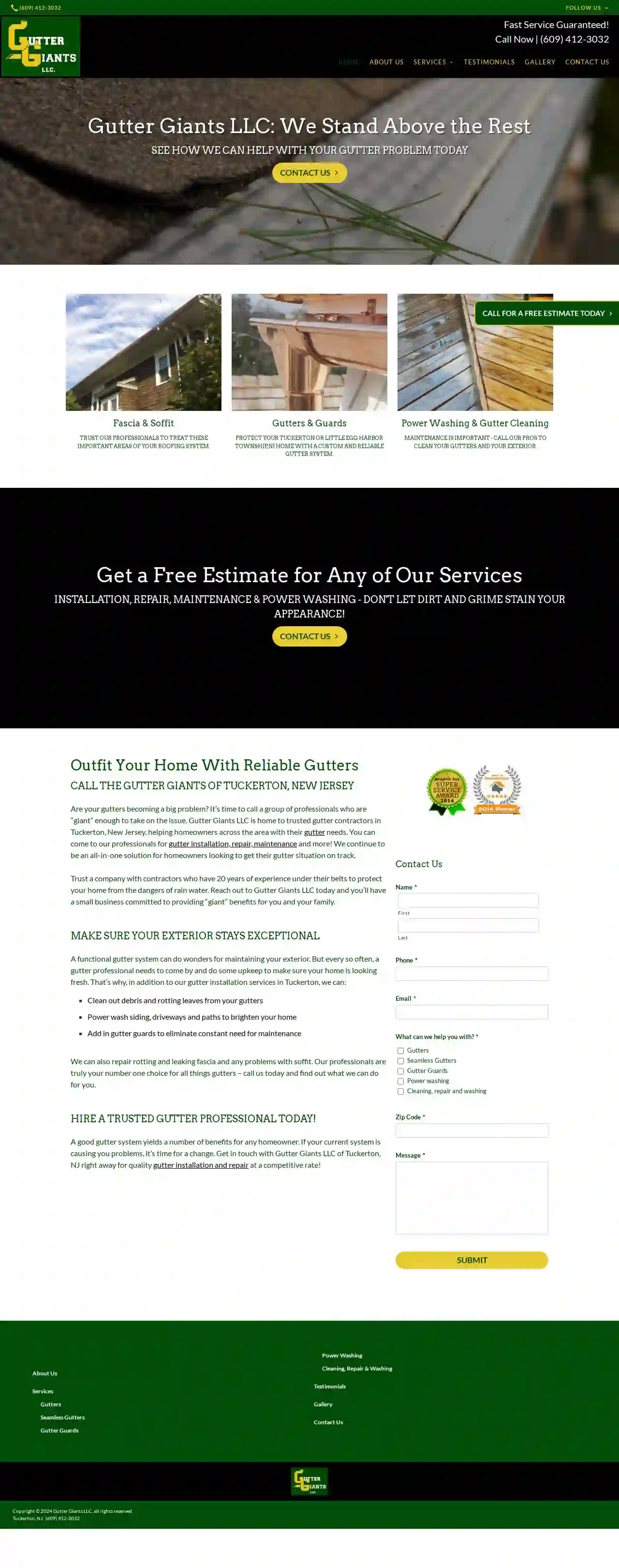Gutter Cleaning Union
Top 10 Roof Gutter Cleaning in Union
Get up to 3 Roof Gutter Cleaning quotes for your project today! Compare profiles, reviews, accreditations, portfolio, etc... and choose the best offer.

CleanRite Exterior Cleaning
5122 reviews258 Mermaid Dr, Manahawkin, 08050, USCleanrite Exterior Cleaning LLC is New Jersey's premier pressure washing company, serving all of Ocean and Monmouth County. We offer detailed pressure washing services for your Manahawkin home or business, including everything from window cleaning to rust removal. Our professional team is prepared to tackle even the toughest cleaning projects, including stains that have been there for years. Whether it's graffiti or general dirt buildup, we can make your stains, blemishes, and scuffs disappear. Plus, our soft wash services will ensure that your more sensitive surfaces don't receive any streaks, cracks, or indentations - we'll always leave them looking better than new. We are proud to service a variety of towns, including Colts Neck, Freehold, Beachwood, Holmdel, Eatontown, Manahawkin, Little Egg Harbor, Barnegat, Bayville, Brick, Forked River, and Waretown. Call our team today at 609-337-4002 for more information!
- Services
- Why Us?
- Accreditations
- Our Team
- Testimonials
- Gallery
Get Quote
Garden State Gutter Cleaning
4.8303 reviews240 Montgomery Street, Bloomfield, 07003, USGarden State Gutter Cleaning, LLC is your trusted partner for all your gutter needs. We offer a comprehensive range of services, including gutter cleaning, repair, installation, and more. Our experienced team is dedicated to providing high-quality workmanship and exceptional customer service. We serve residential and commercial clients throughout New Jersey. Contact us today for a free estimate!
- Services
- Why Us?
- Gallery
Get Quote
Ned Stevens Gutter Cleaning
4.6320 reviewsBurlington, USNed Stevens Gutter Cleaning is a trusted and reliable gutter cleaning service provider with over 50 years of experience. We offer a range of services including gutter cleaning, repair, and installation, as well as exterior home cleaning, power washing, and more. Our team of professionals is dedicated to providing exceptional service and ensuring customer satisfaction. With multiple locations across the United States, we are committed to serving our customers with the highest level of quality and professionalism.
- Services
- Why Us?
- Accreditations
- Our Team
- Testimonials
- Gallery
Get Quote
Peter Weidmann Gutter Services
3.514 reviewsMercer County, USPeter Weidmann Gutter Services and Power Washing has been providing the highest level of Gutter Repair & Cleaning services for our Mercer County NJ and Lower Bucks County PA customers since 1991. All work is done by the company owner, so you'll be getting one-on-one personalized service. We also use the best quality AMERICAN MADE materials. We provide Gutters, Gutter Repair & Gutter Cleaning, Power Washing & Pressure Washing, and Handyman Services & Home Repairs in Mercer County New Jersey (NJ). We also serve Lower Bucks County PA. Our services include Gutter Repair, Gutter Cleaning, Seamless Gutters Installations & Delivery, 5" and 6" Commercial Grade Gutters - 27 Colors Available, Gutter Guards and Leaf Protection Systems, Power Washing and Pressure Washing, Handyman Services, Home Maintenance and Home Repairs, Carpentry, Painting, Roofing, Siding, and Tree Trimming.
- Services
- Why Us?
- Accreditations
- Our Team
- Gallery
Get Quote
Gutter Guys
4.513 reviewsJackson, USThe Gutter Guys is a full-service rain gutter company with over 500,000 happy customers that has been in business since 1988. We install, repair, and clean gutters, as well as provide gutter guards and trim and soffit repair and replacement services in Pennsylvania, New Jersey, Maryland, and Delaware.
- Services
- Why Us?
- Testimonials
- Gallery
Get Quote
Brian C. Jackson & Son LLC Exterior Cleaning Specialists
4.9113 reviewsHudson, NH, 16 Stonewood Lane, 03051, USAt Brian C. Jackson & Son LLC, we have the equipment and skills to clean the exterior of your property with quality results that will improve both the look of your home and the durability of your exterior surfaces. Don’t let algae, mildew, or Fungus ruin your beautiful New England home – call your New Hampshire roof cleaning company today for professional roof cleaning services! Our Soft Washing Technique Just like you keep the interior of your home clean, The Exterior of your home needs to be cleaned occasionally as well – not only to keep it looking beautiful but to ensure structural longevity. This is especially true when it comes to all exterior surfaces on your home in Massachusetts, Maine, and New Hampshire. Dirty roofs, siding, patios & More Left unattended littered with debris can become a breeding ground for algae & organic fungus, causing structural damages.
- Services
- Why Us?
- Testimonials
- Gallery
Get Quote
Princeton Gutters
4.552 reviews100 Overlook Center, 2nd Floor, Princeton, 08540, USPrinceton Gutters is a BBB A+ accredited company with over 20 years of experience providing professional and affordable gutter cleaning, seamless gutter installation, and repair services throughout Central New Jersey and Bucks County, PA. We understand you have many gutter contractors to choose from, which is why we strive to earn your trust and future recommendations. Whether you own a townhome, a multi-million-dollar mansion, or a commercial building, we offer fair and affordable pricing for high-quality work completed within a reasonable timeframe. We are licensed and fully insured, and all materials come with a 20-year warranty, while our workmanship is guaranteed for 10 years. We offer a variety of services including gutter cleaning, seamless gutter installation, gutter replacement, and gutter repair. We work with all types of roofs and home styles and offer both aluminum and copper gutters in various styles and sizes.
- Services
- Why Us?
- Accreditations
- Gallery
Get Quote
The Gutter Goo-Roo, LLC
545 reviewsFort Wayne, 46845, USThe Gutter Goo-Roo is a locally owned and operated pressure washing contractor serving Fort Wayne, New Haven, Columbia City, IN and surrounding areas. We offer a variety of pressure washing services for all types of clean up and curb appeal projects, including driveways, walkways, residential and commercial cleaning. Our team of cleaning technicians is dedicated to your complete satisfaction and provides quality, affordable exterior cleaning. We also offer soft washing, pressure free roof cleaning, surface cleaning and gutter cleaning. All quotes are free.
- Services
- Why Us?
- Gallery
Get Quote
Gutter Giants LLC
4.968 reviewsTuckerton, USGutter Giants LLC: We Stand Above the Rest See how we can help with your gutter problem today Contact Us Fascia & Soffit Trust our professionals to treat these important areas of your roofing system. Gutters & Guards Protect your Tuckerton or Little Egg Harbor Township, NJ home with a custom and reliable gutter system. Power Washing & Gutter Cleaning Maintenance is important - call our pros to clean your gutters and your exterior. Get a Free Estimate for Any of Our Services Installation, repair, maintenance & power washing - don't let dirt and grime stain your appearance! Contact Us Outfit Your Home With Reliable Gutters Call the Gutter Giants of Tuckerton, New Jersey Are your gutters becoming a big problem? It’s time to call a group of professionals who are “giant” enough to take on the issue. Gutter Giants LLC is home to trusted gutter contractors in Tuckerton, New Jersey, helping homeowners across the area with their gutter needs. You can come to our professionals for gutter installation, repair, maintenance and more! We continue to be an all-in-one solution for homeowners looking to get their gutter situation on track. Trust a company with contractors who have 20 years of experience under their belts to protect your home from the dangers of rain water. Reach out to Gutter Giants LLC today and you’ll have a small business committed to providing “giant” benefits for you and your family. Make sure your exterior stays exceptional A functional gutter system can do wonders for maintaining your exterior. But every so often, a gutter professional needs to come by and do some upkeep to make sure your home is looking fresh. That’s why, in addition to our gutter installation services in Tuckerton, we can: Clean out debris and rotting leaves from your gutters Power wash siding, driveways and paths to brighten your home Add in gutter guards to eliminate constant need for maintenance We can also repair rotting and leaking fascia and any problems with soffit. Our professionals are truly your number one choice for all things gutters – call us today and find out what we can do for you. Hire a trusted gutter professional today! A good gutter system yields a number of benefits for any homeowner. If your current system is causing you problems, it’s time for a change. Get in touch with Gutter Giants LLC of Tuckerton, NJ right away for quality gutter installation and repair at a competitive rate!
- Services
- Why Us?
- Gallery
Get Quote
Middlesex Gutter Supply
4.9163 reviewsSuite 150, Princeton, NJ, 08540, 300 Carnegie Center Dr, USMiddlesex Gutter Supply has been providing high quality gutter services to customers for over forty years. From the moment our company was founded in 1979, we have dedicated ourselves to customer service. We provide our customers with high quality gutter services at an affordable rate that beats out the competition. Our passion for our work allows us to provide top-notch customer service, which includes same-day scheduling for our gutter services.
- Services
- Why Us?
- Gallery
Get Quote
Over 60,241+ Cleaning Businesses in our network
Our janitorial pros operate in Union and beyond!
CleaningMatch has curated and vetted the Best Cleaning Services in Union. Find the most trustworthy business today.
Frequently Asked Questions About Gutter Cleaning
- Small House: Cleaning gutters on a small, single-story house may take 1-2 hours.
- Large or Multi-Story House: Cleaning gutters on a larger or multi-story house can take 3-4 hours or more.
- Mesh Gutter Guards: Made of fine mesh that allows water to pass through while blocking debris. Relatively inexpensive and effective but may require occasional cleaning.
- Screen Gutter Guards: Similar to mesh guards but with larger openings, making them less prone to clogging but may not block smaller debris.
- Surface Tension Gutter Guards: Feature a curved design that allows water to adhere and flow into the gutter while debris slides off. Effective but can be more expensive.
- Foam Gutter Guards: Made of foam inserts that block debris but can become saturated with water and deteriorate over time.
- Brush Gutter Guards: Consist of bristles that allow water to pass through while blocking larger debris. May require more frequent cleaning than other types.
- Water Overflowing: Water spilling over the sides of your gutters during rainfall is a clear indication of a clog.
- Sagging Gutters: Gutters filled with debris become heavy and can sag or pull away from the house.
- Water Stains: Water stains on your siding or foundation suggest that your gutters are overflowing.
- Plant Growth: Plants or moss growing in your gutters indicate standing water and clogged downspouts.
- Visible Debris: You can see leaves, twigs, and other debris accumulated in your gutters from the ground.
How long does it take to clean gutters?
Additional services like gutter repair or gutter guard installation will add to the overall time required.
How do I choose the right gutter guards?
The best gutter guards for your home depend on your budget, climate, and the type of debris you experience. Consult with a gutter professional to determine the most suitable option for your needs.
What are the signs of clogged gutters?
If you observe any of these signs, it's essential to schedule a gutter cleaning to prevent potential water damage.
Do I need to be home for gutter cleaning?
However, it's a good idea to inform the company if you won't be home and provide any necessary instructions, such as gate codes or where to leave the debris bags. You may also want to be present for an initial assessment or walk-through to discuss your specific needs and any areas of concern.
How long does it take to clean gutters?
- Small House: Cleaning gutters on a small, single-story house may take 1-2 hours.
- Large or Multi-Story House: Cleaning gutters on a larger or multi-story house can take 3-4 hours or more.
Additional services like gutter repair or gutter guard installation will add to the overall time required.
How do I choose the right gutter guards?
- Mesh Gutter Guards: Made of fine mesh that allows water to pass through while blocking debris. Relatively inexpensive and effective but may require occasional cleaning.
- Screen Gutter Guards: Similar to mesh guards but with larger openings, making them less prone to clogging but may not block smaller debris.
- Surface Tension Gutter Guards: Feature a curved design that allows water to adhere and flow into the gutter while debris slides off. Effective but can be more expensive.
- Foam Gutter Guards: Made of foam inserts that block debris but can become saturated with water and deteriorate over time.
- Brush Gutter Guards: Consist of bristles that allow water to pass through while blocking larger debris. May require more frequent cleaning than other types.
The best gutter guards for your home depend on your budget, climate, and the type of debris you experience. Consult with a gutter professional to determine the most suitable option for your needs.
What are the signs of clogged gutters?
- Water Overflowing: Water spilling over the sides of your gutters during rainfall is a clear indication of a clog.
- Sagging Gutters: Gutters filled with debris become heavy and can sag or pull away from the house.
- Water Stains: Water stains on your siding or foundation suggest that your gutters are overflowing.
- Plant Growth: Plants or moss growing in your gutters indicate standing water and clogged downspouts.
- Visible Debris: You can see leaves, twigs, and other debris accumulated in your gutters from the ground.
If you observe any of these signs, it's essential to schedule a gutter cleaning to prevent potential water damage.
Do I need to be home for gutter cleaning?
However, it's a good idea to inform the company if you won't be home and provide any necessary instructions, such as gate codes or where to leave the debris bags. You may also want to be present for an initial assessment or walk-through to discuss your specific needs and any areas of concern.